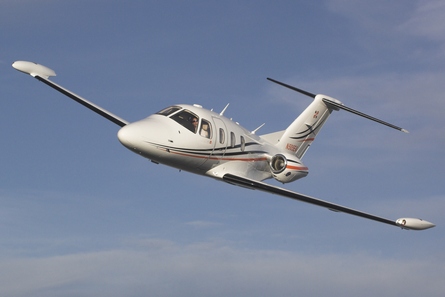Eclipse Aviation could be forced into a two-configuration strategy for the Eclipse 500 if it wants its aircraft to operate in Europe as well as in the USA.
The very light jet has already achieved US certification, but there is no date in sight for European certification, Eclipse Aviation executives said at the EBACE business aviation convention in Geneva last week. A two-configuration move would go directly against the company's plans for the type's worldwide fleet to have a single equipment fit.
 |
|---|
© Eclipse Aviation |
Eclipse's original plan was to have the aircraft certificated by the European Aviation Safety Agency before the end of 2007. This estimated date drifted to the third quarter of 2008, and now Eclipse vice-president business development Brian Couch refuses to give a date by which EASA certification is expected.
In April Paul Hatton of the EASA certification directorate listed numerous concerns unique to all VLJs, but also specific issues for the Eclipse 500. These ranged from the aircraft's slow rate of emergency descent from its 41,000ft (12,500m) ceiling in the event of sudden decompression, to the requirement for stiffer tests on the integrity of the software in the aircraft's highly integrated avionics package, because it has such comprehensive functionality.
However, Eclipse expects that any anticipated EASA demands on equipment or performance would not entail changes to the aircraft that were not already within the company's plans. Couch says EASA requirements mean the aircraft's Avio NG avionics fit has yet to undergo some development before it will be ready for EASA, but says the company was doing that anyway for fleet-wide retrofit.
Similarly, considerable work is needed on the autopilot and autothrottle capabilities, Eclipse concedes, as is work to meet anti-icing standards.
Frank Remmerswaal, managing director of Eclipse's European partner Etirc Aviation (European Technology and Investment Research Centre), admits the aircraft has suffered a failure of its attitude and heading reference system in the brief period that he has been flying the aircraft out of Amsterdam Schiphol under instrument flight rules.
But he says that generally the aircraft is a delight to fly in the airways. He flew it from Amsterdam to Geneva for EBACE, and was cleared to fly at FL370, although he could have taken FL410 if he had chosen to.
Meanwhile Eurocontrol's deputy director of air traffic management strategies Alex Hendriks is preparing data to mount a simulation of the effect on European air traffic management of rapid growth in the VLJ fleet over the next decade.
He says there is an issue as to whether or not VLJs, because they can operate at the levels airlines use, should be compelled to fit airborne collision avoidance systems.
Eclipse chief Vern Raburn has admitted it is not practical to fit the TCAS II version of ACAS that airlines are required to have on the Eclipse 500 because there is nowhere to put the antenna, and he argues against the need for any kind of ACAS.
Source: Flight International























